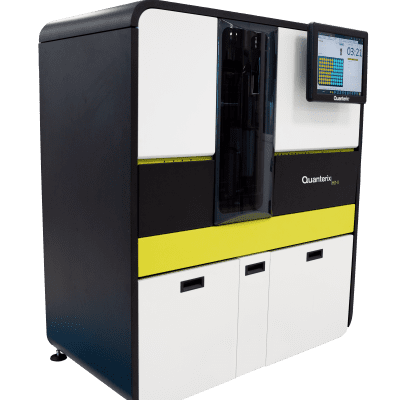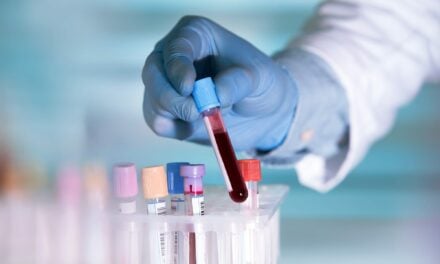Summary:
Quanterix Corporation’s HD-X Simoa Immunoassay Analyzer has received Class 1 Medical Device registration in South Korea, marking a major milestone in expanding its ultrasensitive biomarker detection technology for neurodegenerative disease diagnosis globally.
Takeaways:
- Global Expansion: The South Korean registration reflects growing international validation and adoption of Quanterix’s Simoa platform for minimally invasive, high-sensitivity biomarker testing.
- Alzheimer’s Focus: Recent collaborations with ARUP, Neurogen Biomarking, and Rede D’Or highlight the platform’s critical role in advancing early Alzheimer’s disease detection through blood-based biomarkers like pTau217 and NfL.
- From Research to Diagnostics: Simoa uniquely bridges discovery research, clinical trials, and diagnostics—positioning it as a cornerstone technology in the progression of neurodegenerative disease testing.
Quanterix Corporation, a company fueling scientific discovery through ultrasensitive biomarker detection, today announced that the HD-X Simoa Immunoassay Analyzer has received Class 1 Medical Device registration by the Ministry of Food and Drug Safety (MFDS) in South Korea through its regional distribution partner, HS Biosystems.
Simoa Technology Platform Demonstrates Key Milestone
The continued expansion of the industry-leading Simoa technology platform into global markets demonstrates a key milestone in broadening validation of biomarker-based testing and providing clinicians with minimally invasive tools that can help enhance diagnostic accuracy and improve accessibility. Through its unparalleled sensitivity and multi-marker testing capability, the Simoa platform delivers ultrasensitive biomarker detection in blood, serum or plasma, with the ability to quantify proteins that are far lower than the Level of Quantification (LoQ) of traditional measurement platforms.
“Quanterix is the only platform in the neurodegenerative space that can be used in research to discover a biomarker, power an endpoint in a clinical trial and progress to a diagnostic test,” says Masoud Toloue, chief executive officer at Quanterix. “Other instruments only address narrow use cases, as they are either only high-plex discovery orientated or diagnostic use only. Quanterix makes discovery to diagnostics happen by powering a critical step in between, biopharma clinical trials. As a result, our ultra-sensitive Simoa technology serves as the backbone for many of the Alzheimer’s tests coming to the market today.”
Other recent collaborations that reinforce the clinical utility of this testing include:
- ARUP Laboratories: a leading national reference laboratory that recently launched a blood test for phosphorylated tau 217 (pTau217) to assist in identifying whether cognitive decline symptoms in patients ages 60 years and older are related to Alzheimer’s disease (AD) pathology. ARUP’s test will be performed on Quanterix’s SP-X® platform with the Quanterix Simoa® assay kit, which uses pTau 217 antibody technology licensed from Eli Lilly and Company.
- Neurogen Biomarking: the world’s first ecosystem for memory loss with end-to-end patient support recently announced an easy-to-use at-home blood biomarker collection test that can measure phosphorylated tau 217 (P-tau217), a specific marker for Alzheimer’s disease pathology and MCI, using Quanterix’s highly sensitive technology.
- NSW Health Pathology: the largest public pathology service in Australia, has validated NfL for patient testing.
- Rede D’Or, Richet Laboratory (IDOR): the largest integrated health care network in Brazil, covering over 70 hospitals, was the first Brazilian institution to acquire a Simoa HD-X and implement both pTau217 and NfL for testing. IDOR recently published their first paper in Nature Communications on their work to reduce the underdiagnosis of AD in Brazil.
Accelerating Early Alzheimer’s Detection
According to research, early signs of Alzheimer’s disease (AD) may begin 20 years or more before symptoms appear. The Simoa platform equips customers with advanced insights to help accelerate their research and diagnosis, along with accelerating early detection during this crucial timeframe, allowing patients expanded access to treatments that are not available once the disease has progressed to an advanced stage.
“Our team works primarily on Alzheimer’s Disease and dementia, so from day one, our focus has been on reporting how Simoa biomarkers perform when detecting amyloid status and cognitive decline in a local sample,” says Luis Eduardo da Silva Santos, scientist, Rede D’Or Institute for Research and Education. “IDOR was the first Brazilian institution to acquire a Simoa HD-X and we are excited to see that our work, published in Nature Communications, is now serving as the basis for the local implementation of two Simoa kits, pTau217 ALZpath and NfL. We expect these tests to be more affordable than current alternatives and to contribute to reducing the underdiagnosis of AD in Brazil.”
Featured Image: the HD-X Simoa Immunoassay Analyzer has received Class 1 Medical Device registration by the Ministry of Food and Drug Safety (MFDS) in South Korea. Image: Quanterix Corporation





